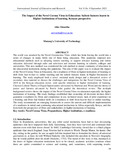The Impact of the Novel Corona Virus in Education: Salient features learnt in Higher Institutions of learning, Kenyan perspective
Abstract
The world was attacked by the Novel Coronavirus Virus which has been forcing the world into a
series of changes in many fields one of them being education. This pandemic imposed new
educational methods such as adopting remote teaching to support distance learning and online
education delivered through radio and television and internet learning in schools, colleges and
universities. This new method was considered the sole method to ensure continuity of education in
the educational institutions during this pandemic. The aim of this paper was to evaluate the impact
of the Novel Corona Virus in Education, the e-readiness of Dons in higher institutions of learning to
shift from face-to-face to online teaching and the salient features learnt in Higher Institutions of
learning. The study employed both a cross- sectional study design and a theoretical review of
secondary data material to discuss the challenges and mitigations for the Novel Corona Virus of
2019 in the Kenyan education sector, with specific reference to higher institutions of learning.
Classical Liberal Theory of Equal Opportunities advocated by Sherman and Wood and the theory of
justice and fairness advanced by Rawls John guided the theoretical review. The in-depth
background review shows the impact of the Novel Corona Virus on education especially the higher
institutions of learning. The study findings established that ownership of electronic devices didn’t
guarantee e-readiness by Dons and competence in use, technical issues, lack of prior experience on
e-learning and Dons had limited skills on e-readiness to shift from face-to face to online teaching.
The study recommends an emerging framework to assess the uneven and difficult implementation
of e-readiness in initial and continuing educational institutions in Africa especially Kenya, and this
form both the perspective of Dons and stakeholders in higher institutions of learning.

